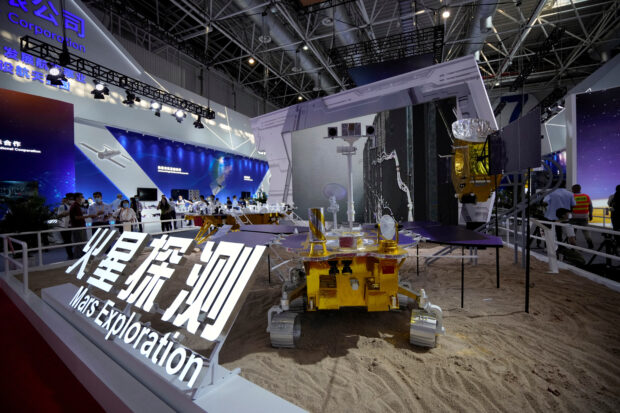China breaks silence over status of stationary Martian rover

A model of Chinese Mars rover Zhurong, part of China’s Tianwen-1 space mission, is seen displayed at the China International Aviation and Aerospace Exhibition, or Airshow China, in Zhuhai, Guangdong province, China September 28, 2021. REUTERS FILE PHOTO
BEIJING — China’s fully robotic rover on Mars, in longer-than-expected hibernation since May 2022, likely met with excessive accumulation of sand and dust, its mission designer said, breaking months of silence about the status of the vehicle.
The motorized rover Zhurong, named after a mythical Chinese god of fire, was expected to have woken up in December after entering a planned sleep mode in May 2022 as falling solar radiation with the advent of winter cut its power generation.
An unforeseen pile-up of dust most likely affected power generation and Zhurong’s ability to wake up, Chinese state television reported on Tuesday, quoting Zhang Rongqiao, chief designer of China’s Mars exploration program.
A camera on board a NASA probe orbiting Mars showed the Chinese rover had not moved since at least September, according to official images.
The 240-kg (530-pound) Zhurong, which has six scientific instruments including a high-resolution topography camera, was tasked with studying the planet’s surface soil and atmosphere after landing with no mishap in May 2021.
Article continues after this advertisementPowered by solar energy, Zhurong also looked for signs of ancient life, including any subsurface water and ice, using a ground-penetrating radar.
Article continues after this advertisementThe rover had explored the Martian surface for 358 days and traveled for 1,921 meters (2,100 yards), Zhang said, far exceeding its original mission time-span of three months.
Aside from Zhurong, two other robotic rovers have been operating on Mars – NASA’s Perseverance and Curiosity, with the former roaming the planet’s surface for more than two years and the latter for over a decade.
RELATED STORIES
China’s Mars rover starts roaming the Red Planet
Chinese astronauts set up new lab on space station